Original Posting Date: Sunday December 30th 2007
Okay, a short entry for those, who don't read the comments.
It's true, this year December 24th was a public holiday, but only because the 23rd was a Sunday. Namely December 23rd is the birthday of His Majesty, Emperor Akihito, and in that a national holiday. Since it fell on a Sunday this year the rule comes into effect whereby if a holiday falls on a Sunday the next Monday is off.
Many thanks to Helmut for reminding me on that rule.
Friday 22 October 2010
Thursday 21 October 2010
Supplement
Original Posting Date: Saturday December 29th 2007
Today I'm catching up on several things, the writing of which I already mentioned several times or talked about as an aside respectively.
But first:
A thanks to my parents for the Christmas package and above all for the Chistmas pastries!
I myself hardly ate anything of it since I rather distributed it to friends and acquaintances (first and foremost Japanese of course), to teach them a piece of real Christmas culture. To say they were exhilarated is an understatement. When I gave the people, after sharing in the German course, the remaining pastries for taking home they not only bagged the pieces but also the crumbs.
A heartful Thank you also to Pia and Bernhard for their great Christmas present, which they handed me per Amazon:

As customary in Japan it was packaged 4 times.
Here are "my" German students:


I more or less stumbled into that course by accident. My academic advisor teaches German (he also got the exchange programme with Graz on the roll) and in October he invited me to stop by the class and of course one cannot say no. The 2. teacher is, as already mentioned, the only Austrian I know here and since it was pretty enjoyable to help the Japanese with their language tries I got stuck and every Friday evening I'm now some sort of "Language aid" (at the time of the Tuesday course I have other classes). I can learn for my studies when the professors explain grammar and help the students with their exercises (good thing I had such a strict German teacher, this way a big chunk of German grammar actually got stuck in my head. Thanks Professor Hiti). Whereat Professor Trummer and I conspiratorial teach the Students in talking and during the exercises Austrian German. In addition I also explain to them the classic orthography ("better would be ß instead of ss, also because of the sprachgefühl/feel for language, and the pronunciation"), namely for all I care the new orthography can go to h... .
I held a presentation about Austria as well. A little bit of history, the Burgenland, my hometown including scenery photos and Austrian and regional culture respectively. For this topic I showed them photos of the concert band, Buschenschank (ed. untranslatable, please refer to Google or Wikipedia) and a short video of the folk dance group, as well as pictures of the Uhudler-wine route festival (ad Seidl and Berni: Not only my host family but also my students were taken with you).
Side note: Among the participants, who in general are all students, there are also two Ladies, one over 40 the other over 50 years old. In Japan this is nothing extraordinarily, often "senior students" are attending miscellaneous classes (mostly outside University fields) to educate themselves, with ambition, the two of them are one of the better of the class.
As covered, New Year cards are very popular in Japan. Below those which I sent my host family.
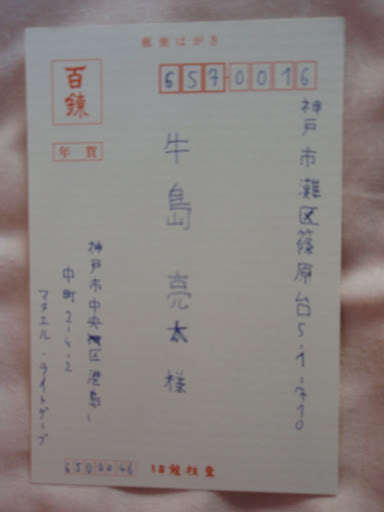
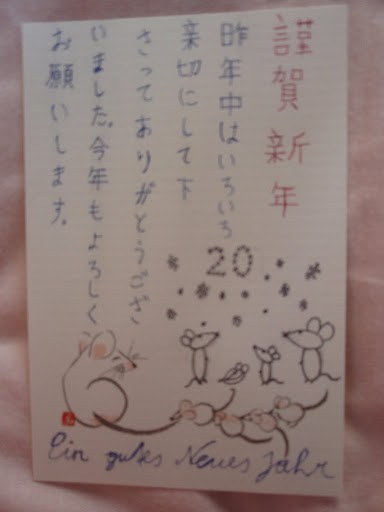
First picture: The 2 horizontal characters in the left upper-most corner account the card as New Years card, in that the post delivers it exactly on January 1st. If someone has a blank card one needs to add those or else it gets delivered earlier, which isn't that good, since the Japanese most rejoice if it arrives precisely on January 1st.
Second picture: Written by myself, attention, read from right to left. The red writing (kingashinnen) means "A happy New Year" and is a little old polite/courtly expression, which is nearly exclusively used in written language. In colloquial language other are in use but I simply like it traditional. The blue writing's meaning is approximately: "I thank you for your help (assistance, for everything), that you have done for me during the last year and hope that this year too our relationship will stay a good one." (not literally translated). Since the year of the mouse is around the corner, below that the usual mouse-motifs, although the ones on the right I drew myself. Indeed when it comes to art, drawing, painting etc., except music, I'm normally an absolutely untalented failure but I think those I managed to draw quite decent, though unfortunately the photo is too blurred as to one could make out the snow flakes well. As to why over the mice the year 20 is presented instead of 2008, that is part of the Japanese method of counting and I will explain it another time (ah, smells like "Supplement" part 2!)
And of course at the end of the card: The wishes in German.
Some photos from our visit to a club in Osaka:
On the right the female Swede, whose birthday we celebrated (some people are missing on the picture)

Mikael doesn't have his hands under control (then again he actually acted by request)

Two photos of the dance floor


These two still belong to lower levels, concerning "salacious" clothing.
(Although from the front they already were average)

As one can see with our companions, different ways are possible (a little bit more normal)

Interesting (and funny) facts/opinions about Japan:
The life in Japan is often very exhausting and wearying. Even during the student part of life, which is by many considered to be the best time with the most leisure time, it is nevertheless arduous, since many students, in addition to their studies and their club activities, also hold down a part time job, so that they can afford certain expenses, whereat the studies themselves are already expensive enough (several thousand Euro of study fees per year at a public university). Thanks to those demands, next to the "traditional" student life in respect of going out, one can, especially in Japan (rumor has it exists in other Asian countries too), observe an interesting phenomena: A decent percentage of students who brazenly sleep during lectures. In classes with smaller groups (5-15 people) it is not that predominant, but in classes with 30 and more some are already swaying in the arms of Morpheus. The most striking in that regard: It is being accepted and tolerated by the lecturing professors. For those know, that their students will enter the work force in the foreseeable future, and like amply known, this is truly no bed of roses in Japan. Since there is relatively few active collaboration on part of the students in the Japanese university system, and the review of the performance is mostly handled by exams, presentation and seminar papers, the sleeping has for the most part no influence on the semester end performance. Now, before some readers start to wistfully remember the earlier handling of attendance at Austrian universities, it has to be mentioned at this point, that yet at most lectures a mandatory attendance of 70 percent prevails. One can indeed sleep from time to time yet one has to be at least physically present, than latitude has its limits here as well.
Correspondingly, many students make use of possible free periods to treat themselves to a little sleep, like one might notice on the following photo. To the author this is greatly reminiscent of the time of his basic training at the Austrian Army, at which the soldiers too used every free minute to at least doze.
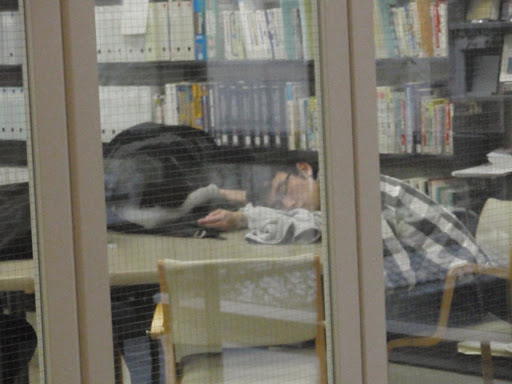
Note by the editorial department: There won't be a new report on next Wednesday, since I will be in Tokyo at that point, maybe again on the following Thursday or Friday.
Today I'm catching up on several things, the writing of which I already mentioned several times or talked about as an aside respectively.
But first:
A thanks to my parents for the Christmas package and above all for the Chistmas pastries!
I myself hardly ate anything of it since I rather distributed it to friends and acquaintances (first and foremost Japanese of course), to teach them a piece of real Christmas culture. To say they were exhilarated is an understatement. When I gave the people, after sharing in the German course, the remaining pastries for taking home they not only bagged the pieces but also the crumbs.
A heartful Thank you also to Pia and Bernhard for their great Christmas present, which they handed me per Amazon:
As customary in Japan it was packaged 4 times.
Here are "my" German students:
I more or less stumbled into that course by accident. My academic advisor teaches German (he also got the exchange programme with Graz on the roll) and in October he invited me to stop by the class and of course one cannot say no. The 2. teacher is, as already mentioned, the only Austrian I know here and since it was pretty enjoyable to help the Japanese with their language tries I got stuck and every Friday evening I'm now some sort of "Language aid" (at the time of the Tuesday course I have other classes). I can learn for my studies when the professors explain grammar and help the students with their exercises (good thing I had such a strict German teacher, this way a big chunk of German grammar actually got stuck in my head. Thanks Professor Hiti). Whereat Professor Trummer and I conspiratorial teach the Students in talking and during the exercises Austrian German. In addition I also explain to them the classic orthography ("better would be ß instead of ss, also because of the sprachgefühl/feel for language, and the pronunciation"), namely for all I care the new orthography can go to h... .
I held a presentation about Austria as well. A little bit of history, the Burgenland, my hometown including scenery photos and Austrian and regional culture respectively. For this topic I showed them photos of the concert band, Buschenschank (ed. untranslatable, please refer to Google or Wikipedia) and a short video of the folk dance group, as well as pictures of the Uhudler-wine route festival (ad Seidl and Berni: Not only my host family but also my students were taken with you).
Side note: Among the participants, who in general are all students, there are also two Ladies, one over 40 the other over 50 years old. In Japan this is nothing extraordinarily, often "senior students" are attending miscellaneous classes (mostly outside University fields) to educate themselves, with ambition, the two of them are one of the better of the class.
As covered, New Year cards are very popular in Japan. Below those which I sent my host family.
First picture: The 2 horizontal characters in the left upper-most corner account the card as New Years card, in that the post delivers it exactly on January 1st. If someone has a blank card one needs to add those or else it gets delivered earlier, which isn't that good, since the Japanese most rejoice if it arrives precisely on January 1st.
Second picture: Written by myself, attention, read from right to left. The red writing (kingashinnen) means "A happy New Year" and is a little old polite/courtly expression, which is nearly exclusively used in written language. In colloquial language other are in use but I simply like it traditional. The blue writing's meaning is approximately: "I thank you for your help (assistance, for everything), that you have done for me during the last year and hope that this year too our relationship will stay a good one." (not literally translated). Since the year of the mouse is around the corner, below that the usual mouse-motifs, although the ones on the right I drew myself. Indeed when it comes to art, drawing, painting etc., except music, I'm normally an absolutely untalented failure but I think those I managed to draw quite decent, though unfortunately the photo is too blurred as to one could make out the snow flakes well. As to why over the mice the year 20 is presented instead of 2008, that is part of the Japanese method of counting and I will explain it another time (ah, smells like "Supplement" part 2!)
And of course at the end of the card: The wishes in German.
Some photos from our visit to a club in Osaka:
On the right the female Swede, whose birthday we celebrated (some people are missing on the picture)
Mikael doesn't have his hands under control (then again he actually acted by request)
Two photos of the dance floor
These two still belong to lower levels, concerning "salacious" clothing.
(Although from the front they already were average)
As one can see with our companions, different ways are possible (a little bit more normal)
Interesting (and funny) facts/opinions about Japan:
The life in Japan is often very exhausting and wearying. Even during the student part of life, which is by many considered to be the best time with the most leisure time, it is nevertheless arduous, since many students, in addition to their studies and their club activities, also hold down a part time job, so that they can afford certain expenses, whereat the studies themselves are already expensive enough (several thousand Euro of study fees per year at a public university). Thanks to those demands, next to the "traditional" student life in respect of going out, one can, especially in Japan (rumor has it exists in other Asian countries too), observe an interesting phenomena: A decent percentage of students who brazenly sleep during lectures. In classes with smaller groups (5-15 people) it is not that predominant, but in classes with 30 and more some are already swaying in the arms of Morpheus. The most striking in that regard: It is being accepted and tolerated by the lecturing professors. For those know, that their students will enter the work force in the foreseeable future, and like amply known, this is truly no bed of roses in Japan. Since there is relatively few active collaboration on part of the students in the Japanese university system, and the review of the performance is mostly handled by exams, presentation and seminar papers, the sleeping has for the most part no influence on the semester end performance. Now, before some readers start to wistfully remember the earlier handling of attendance at Austrian universities, it has to be mentioned at this point, that yet at most lectures a mandatory attendance of 70 percent prevails. One can indeed sleep from time to time yet one has to be at least physically present, than latitude has its limits here as well.
Correspondingly, many students make use of possible free periods to treat themselves to a little sleep, like one might notice on the following photo. To the author this is greatly reminiscent of the time of his basic training at the Austrian Army, at which the soldiers too used every free minute to at least doze.
Note by the editorial department: There won't be a new report on next Wednesday, since I will be in Tokyo at that point, maybe again on the following Thursday or Friday.
Thursday 14 October 2010
Christmas? What's that?
Original Posting Date: Wednesday December 25th 2007
Today we cover the question: How is Christmas celebrated in Japan, is it being celebrated at all, respectively?
It will serve as good impression when I tell you that today I was at the Uni for the purpose of attending a class. Yes, that's right no holidays, since the 24th, 25th and 26th are normal working days here. Concerning Uni: Although there isn't regular instruction anymore, this week extra classes are being held (e.g. if too many classes are cancelled during the semester), since officially Uni doesn't close until the 28th. Christmas has virtually no relevance here (with only 2-3% Christians not astonishing), and nearly everything that's used is imported from the US(carols, decoration etc.). The 24th and 25th are days rather for young/just-in-love couples at which they undertake something together, for they rest these are more or less normal working-days.
But:
New Year is in exchange enormous. The turn of the year is one of the most important (maybe THE most important) celebration of the whole year, on which one is together with his family, presents are given (first and foremost to the children), as well as good food (traditional dishes) and sweets are served. There are also many special celebrations held in the temples etc. in short, New Year is to the Japanese what Christmas is to us. Side Note: 2008 is the year of the Mouse because of which everything is ornamented accordingly and the traditional New Years cards, which are far more common then Christmas cards at home, share mouse-motifs. The cards are delivered precisely at January 1st, the postmen are therefore part of the few people working.
Supplement to last entry
Onsen:
Onsen (温泉=warm springs) are originally thermal springs and traditionally the water is contained in natural pools (stone) outdoors, at which the areas for men and women are separated by a wooden wall in the middle, since one bathes naked. There are still many traditional pools in Japan, however those are in comparison often relatively expensive and situated in a little bit remote areas. Most (like in Arima) are inside buildings, offer a hot and sometimes a cold pool and a sauna. The remaining tradition stays intact: Bathing naked, men and women separated correspondingly and the most important thing: Before one is going into the pool one must first clean oneself thoroughly at extra washing places, including shampoo and shower gel, in order that the water stays clean. Then there are also Spas, which are onsen at which the water comes not from a natural hot spring and isn't rich in minerals, however they often have additional basins and other extras respectively, in principle they are little spas but without "action"-gimmicks and "wellness"-nonsense respectively (ed. in German the word "wellness" has derived from its original meaning and is used as marketing buzz-word for things/services that might (or often might not) help your wellbeing but are many times just really expensive). Concerning price, one forks out 500 to 900 yen for the natural indoor onsen (this was in Arima which is said to be more expensive than normal, though) and around 300 yen for a visit to a Spa respectively. Equalling to 3 - 5.50 Euro and 1.80 Euro respectively (ed. State of winter 2007), however for that money one can use everything (even the sauna) and can stay as long as one wants or until the onsen closes. Costs "a little bit" less than a Spa at home, right?
Interesting (and funny) facts/opinions about Japan:
As mentioned earlier most divorces in Japan happen, statistically, after the husband has retired. As several Japanese explained to me these are the incitements for this: The husband works for decades at his company and many times with advancing age more responsibility and decision power is confered to him. The wife is often "only" a housewife/hausfrau whereas many women by all means satisfied with it, since through this they can escape the hard, to my subjective impression in Japan sometimes even inhuman, working world. Though at home they are the boss. The housewife does not only raise the children, cooks the dishes and takes care of the rest of the household but also decides what is done and in which manner. The husband nearly never interferes but leaves nearly everything to the discretion of his wife, on the contrary most of the time he is glad if he does not have to do much when he comes home from a long working day. As such the wife reigns almost supreme over the household. Most of you will already be perceiving where I am getting with this entry.
Many husbands, who then retire, cannot really cope with the new situation and start or try to take up more in the household, some, who now lack occupation, want to have something to work at again, while some do not want to accept the loss of responsibility and even power and start to give their wives "advice" and of course know how things could be done in a better way. The wives for their part, after decades are not used to sharing their work, which often follows a structured plan, and they do not let themselves being bossed around respectively. For these circumstances and since there are no any children, who need to be looked after, in the house anymore, sadly insurmountable discrepancies can occur and eventually it may result in a divorce.
Today we cover the question: How is Christmas celebrated in Japan, is it being celebrated at all, respectively?
It will serve as good impression when I tell you that today I was at the Uni for the purpose of attending a class. Yes, that's right no holidays, since the 24th, 25th and 26th are normal working days here. Concerning Uni: Although there isn't regular instruction anymore, this week extra classes are being held (e.g. if too many classes are cancelled during the semester), since officially Uni doesn't close until the 28th. Christmas has virtually no relevance here (with only 2-3% Christians not astonishing), and nearly everything that's used is imported from the US(carols, decoration etc.). The 24th and 25th are days rather for young/just-in-love couples at which they undertake something together, for they rest these are more or less normal working-days.
But:
New Year is in exchange enormous. The turn of the year is one of the most important (maybe THE most important) celebration of the whole year, on which one is together with his family, presents are given (first and foremost to the children), as well as good food (traditional dishes) and sweets are served. There are also many special celebrations held in the temples etc. in short, New Year is to the Japanese what Christmas is to us. Side Note: 2008 is the year of the Mouse because of which everything is ornamented accordingly and the traditional New Years cards, which are far more common then Christmas cards at home, share mouse-motifs. The cards are delivered precisely at January 1st, the postmen are therefore part of the few people working.
Supplement to last entry
Onsen:
Onsen (温泉=warm springs) are originally thermal springs and traditionally the water is contained in natural pools (stone) outdoors, at which the areas for men and women are separated by a wooden wall in the middle, since one bathes naked. There are still many traditional pools in Japan, however those are in comparison often relatively expensive and situated in a little bit remote areas. Most (like in Arima) are inside buildings, offer a hot and sometimes a cold pool and a sauna. The remaining tradition stays intact: Bathing naked, men and women separated correspondingly and the most important thing: Before one is going into the pool one must first clean oneself thoroughly at extra washing places, including shampoo and shower gel, in order that the water stays clean. Then there are also Spas, which are onsen at which the water comes not from a natural hot spring and isn't rich in minerals, however they often have additional basins and other extras respectively, in principle they are little spas but without "action"-gimmicks and "wellness"-nonsense respectively (ed. in German the word "wellness" has derived from its original meaning and is used as marketing buzz-word for things/services that might (or often might not) help your wellbeing but are many times just really expensive). Concerning price, one forks out 500 to 900 yen for the natural indoor onsen (this was in Arima which is said to be more expensive than normal, though) and around 300 yen for a visit to a Spa respectively. Equalling to 3 - 5.50 Euro and 1.80 Euro respectively (ed. State of winter 2007), however for that money one can use everything (even the sauna) and can stay as long as one wants or until the onsen closes. Costs "a little bit" less than a Spa at home, right?
Interesting (and funny) facts/opinions about Japan:
As mentioned earlier most divorces in Japan happen, statistically, after the husband has retired. As several Japanese explained to me these are the incitements for this: The husband works for decades at his company and many times with advancing age more responsibility and decision power is confered to him. The wife is often "only" a housewife/hausfrau whereas many women by all means satisfied with it, since through this they can escape the hard, to my subjective impression in Japan sometimes even inhuman, working world. Though at home they are the boss. The housewife does not only raise the children, cooks the dishes and takes care of the rest of the household but also decides what is done and in which manner. The husband nearly never interferes but leaves nearly everything to the discretion of his wife, on the contrary most of the time he is glad if he does not have to do much when he comes home from a long working day. As such the wife reigns almost supreme over the household. Most of you will already be perceiving where I am getting with this entry.
Many husbands, who then retire, cannot really cope with the new situation and start or try to take up more in the household, some, who now lack occupation, want to have something to work at again, while some do not want to accept the loss of responsibility and even power and start to give their wives "advice" and of course know how things could be done in a better way. The wives for their part, after decades are not used to sharing their work, which often follows a structured plan, and they do not let themselves being bossed around respectively. For these circumstances and since there are no any children, who need to be looked after, in the house anymore, sadly insurmountable discrepancies can occur and eventually it may result in a divorce.
Wednesday 29 September 2010
Disgrace and Festivals
Original Posting Date: Wednesday December 23rd 2007
Yes, shame on me, I missed an update. As compensation there will be more than usual during the christmas holidays, although on thing in advance: The holidays here are shorter than at home, for instance I still have a course at Uni on the 25th of December because officially the Uni closes not until the 28th. But more about that after Christmas Eve.
Well then. A week ago on Saturday I was at the so-called "Luminarie"-Festival celebration in Kobe, the word stems from the italian "illuminari" and is, as the name suggests, a festival of lights. At this, a street of houses is being decorated with countless colourful (electric) lights, which in fact look a little campy but nonetheless the whole thing is very beautiful. At the end there waits yet some kind of illuminated small pavillion. From the speakers along the street sound baroque and sacred music, which adds a really nice note (literally). Unfortunately the usual announcements are also omnipresent ("Caution, don't bump into anyone," etc.), these are still very distracting.
The festival itself is a distinctiveness of Kobe, and it just exists since 1995, als commemoration on the great Hanshin-earthquake of the 17th of January 1995, which hit Kobe the hardest. To my knowledge the lights were handed as present by the Italian government and since they are allegedly hand-painted they also have a high artistic value. The lights are being illuminated over a course of time of two weeks on each evening for a couple of hours, and as it is often the case crowds pf people adjourn there: Despite the closing of a couple of streets it takes one ca. 1 1/2 hours until one finally sees the lights, the whole thing has (once again) the character of a folk festival.
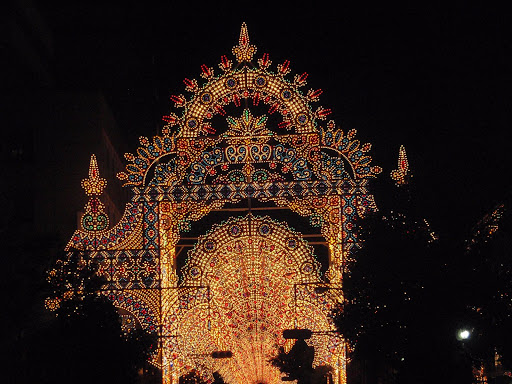
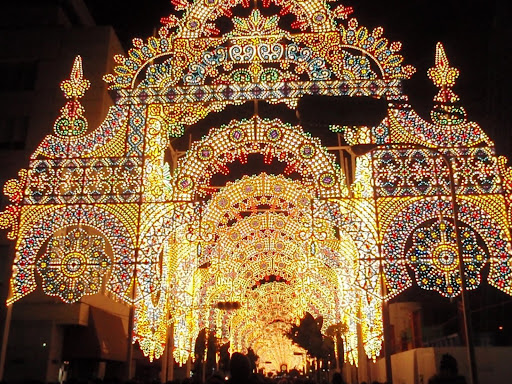
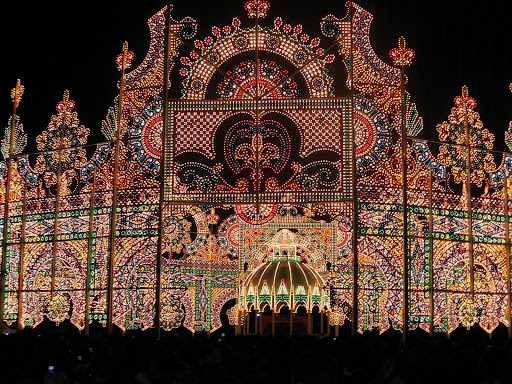
More photos, as usual, in the album
Concerning the earthquake itself: At this point just a few marginal facts since it is pretty good described on Wikipedia. It hit Kobe in the morning hours of the 17th of January (at roughly 5:46 o'clock) and is seen as the biggest desaster which ever afflicted the city. Although "only" a little bit over 6000 people lost their lives, the infrastructural damage in the city and the suburbs was immense. Above that, the government in Tokyo completely messed up on the catastrophe management (comparable to the US-government when New Orleans was flooded). Major parts of the city and the harbour were destroyed on such a degree that swaths had to be completely newly built and because of the earthquake Kobe ultimately lost its rank as most important non-oil harbour to Yokohama. Until today the memories are very strong, as exchange student at University I already heard three lectures about the earthquake. However it was also an unparalleled event insofar as help and cooperation beyond borders is concerned and of self-organisation, since the government offices failed to act (even the Kobe-located Yamaguchi-gumi Yakuza helped without expecting anything).
If anyone wants to know more details and doesn't really trust in Wikipedia, please contact me after my return, I received several books and infos about it from the University.
On Sunday David and I were once again hiking. This time we crossed the ridge and marched to the Onsen (hot springs) in Arima. These are said to already be in use for around 1000 years (or more) and it is told they were the favourite Onsen of the famous country-unifier Hideyoshi Toyotomi. At any rate many hotels exist in Arima (among them are several luxury ones) and a "big pile" of Onsen establishments.
More detailed annotations concerning Onsen in the next report or else this one would get too long.
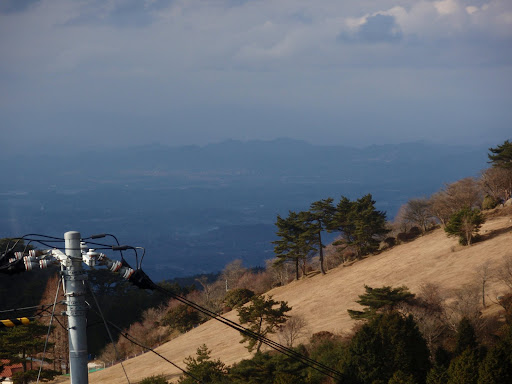
On Tuesday I was at a little Christmas celebration of the German Language course (also in one of the next entries: how I got into that course). In any case the second teacher of the course is an Austrian from Bruck an der Mur (Name: Stefan Trummer), the only one I can really speak in a normal manner with, simly in good Austrian. For that reason we arranged the party in a little Austrian fashion, with permission of the "main" teacher, to show the participants how a piece of traditional Christmas looks like, without commerce, commercialism and American kitsch ("American" since in Japan Christmas came for the most part from the US, but we ourselves produce more than enough kitsch). Hence we told them stories about Christmas, where it comes from, "Christkind" instead of Santa Claus, that celebtration is on the eve of the 24th, who is Saint Nicholas etc. and afterwards Trummer-sensei performed a few traditionell carols (as my friends know. I have a hideous singing voice) and the highlight of the evening: The two of us brewed a small pot of hot spiced wine. Since he obtained the ingredients from Austria it was a real original one. The hot spiced wine was well recieved especially with the Japanese professor (he has already been to Graz several times and discovered his love for it there) and with the girl with roots from Ukraine. She would have drunken all of it by herself, for of course we had way too less of it. Like all Japanese celebrations this one also ended on schedule at a predetermined time, regardless for me it was above all a piece of real Christmas.

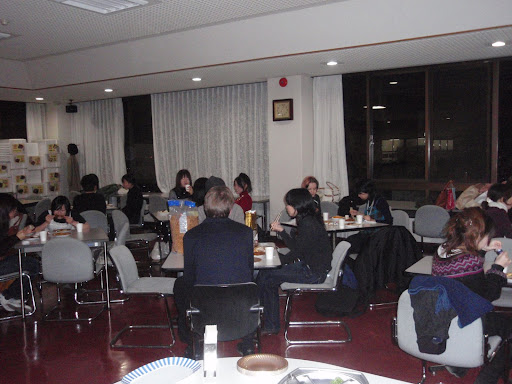
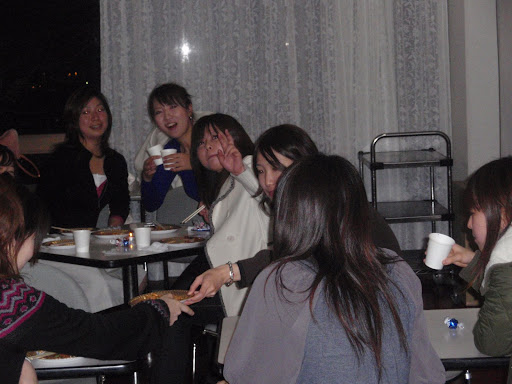
Interesting (and funny) facts/opinions about Japan:
Whenever public festivals are held in Japan, umpteen people are hired as marshaller, aides and security personell (mostly it's done by private firms under patronage of the police). While at first this seems quite natural gets weird fast for someone from a Western culture, if you set the focus on the traffic aides: There are always several people present to fulfill assignements which are for a visitor himself self-evident without help. One example as clarification: Visitor streams are coming from two sides crossing one street (which is anyway regulated by traffic light) to "merge" and move forward in the same direction. Now, this queuing is not left to the visitors, no, peace officers/wardens periodically stop one stream to let a certain amount of guests of the second to join in, afterwards they alternate. Also, this duty is not done by 1-2 marshaller, more wouldn't be necessary anyway, but by 5 sometimes more people. In short, everything is planned through down to the smallest detail, nothing is left to chance and, God forbid, it came to an outburst of self-initiative. It has more of an amusing effect to the author, but as experienced for oneself during the summer after fireworks in Tokyo, it is indeed pleasing if one looses the way to "his" station in the masses and one can quickly ask the next aid (or take a look at the signs with directions, held up by them).
At the end of the entry there will be a video about it.
In Japanese society this very well makes sense: The visitors feel safe and protected, and go to the festival knowing that someone is always in the background watching over them. The marhaller are given the feeling they are needed and every last one of them fulfills a purpose. For the same reason one can often see old men (age over 60, 70 years), acting as security guards in shopping arcades or as kind of signaler at construction sites. For although they don't serve a real objective purpose, it is important for them personally to have the feeling to still fulfil a function in the society, because they are too old (per law) for "real" work and/or too frail. For that matter, in Japanese society retirement is subjectively often seen as something bad, since one has nothing to do anymore and above all cannot contribute anything to the well-being of the society anymore (what difference to us, see Post office retirements et. al.). For this reason there also exist opinions (for example form one of my professors, Age: 60), which say the government should raise the retirement age, so that people can work longer for their companies. Mind you though, the CHANCE to work longer, NOT the enforcement to it, also in the face of the, especially in Japan, rapid ageing of the population. However, many companies have understandably several reservations to it.
In our next issue a little bit more about it, especially in the view that most divorces in Japan are occuring after the husband is in retirement.
Yes, shame on me, I missed an update. As compensation there will be more than usual during the christmas holidays, although on thing in advance: The holidays here are shorter than at home, for instance I still have a course at Uni on the 25th of December because officially the Uni closes not until the 28th. But more about that after Christmas Eve.
Well then. A week ago on Saturday I was at the so-called "Luminarie"-Festival celebration in Kobe, the word stems from the italian "illuminari" and is, as the name suggests, a festival of lights. At this, a street of houses is being decorated with countless colourful (electric) lights, which in fact look a little campy but nonetheless the whole thing is very beautiful. At the end there waits yet some kind of illuminated small pavillion. From the speakers along the street sound baroque and sacred music, which adds a really nice note (literally). Unfortunately the usual announcements are also omnipresent ("Caution, don't bump into anyone," etc.), these are still very distracting.
The festival itself is a distinctiveness of Kobe, and it just exists since 1995, als commemoration on the great Hanshin-earthquake of the 17th of January 1995, which hit Kobe the hardest. To my knowledge the lights were handed as present by the Italian government and since they are allegedly hand-painted they also have a high artistic value. The lights are being illuminated over a course of time of two weeks on each evening for a couple of hours, and as it is often the case crowds pf people adjourn there: Despite the closing of a couple of streets it takes one ca. 1 1/2 hours until one finally sees the lights, the whole thing has (once again) the character of a folk festival.

More photos, as usual, in the album
Concerning the earthquake itself: At this point just a few marginal facts since it is pretty good described on Wikipedia. It hit Kobe in the morning hours of the 17th of January (at roughly 5:46 o'clock) and is seen as the biggest desaster which ever afflicted the city. Although "only" a little bit over 6000 people lost their lives, the infrastructural damage in the city and the suburbs was immense. Above that, the government in Tokyo completely messed up on the catastrophe management (comparable to the US-government when New Orleans was flooded). Major parts of the city and the harbour were destroyed on such a degree that swaths had to be completely newly built and because of the earthquake Kobe ultimately lost its rank as most important non-oil harbour to Yokohama. Until today the memories are very strong, as exchange student at University I already heard three lectures about the earthquake. However it was also an unparalleled event insofar as help and cooperation beyond borders is concerned and of self-organisation, since the government offices failed to act (even the Kobe-located Yamaguchi-gumi Yakuza helped without expecting anything).
If anyone wants to know more details and doesn't really trust in Wikipedia, please contact me after my return, I received several books and infos about it from the University.
On Sunday David and I were once again hiking. This time we crossed the ridge and marched to the Onsen (hot springs) in Arima. These are said to already be in use for around 1000 years (or more) and it is told they were the favourite Onsen of the famous country-unifier Hideyoshi Toyotomi. At any rate many hotels exist in Arima (among them are several luxury ones) and a "big pile" of Onsen establishments.
More detailed annotations concerning Onsen in the next report or else this one would get too long.
On Tuesday I was at a little Christmas celebration of the German Language course (also in one of the next entries: how I got into that course). In any case the second teacher of the course is an Austrian from Bruck an der Mur (Name: Stefan Trummer), the only one I can really speak in a normal manner with, simly in good Austrian. For that reason we arranged the party in a little Austrian fashion, with permission of the "main" teacher, to show the participants how a piece of traditional Christmas looks like, without commerce, commercialism and American kitsch ("American" since in Japan Christmas came for the most part from the US, but we ourselves produce more than enough kitsch). Hence we told them stories about Christmas, where it comes from, "Christkind" instead of Santa Claus, that celebtration is on the eve of the 24th, who is Saint Nicholas etc. and afterwards Trummer-sensei performed a few traditionell carols (as my friends know. I have a hideous singing voice) and the highlight of the evening: The two of us brewed a small pot of hot spiced wine. Since he obtained the ingredients from Austria it was a real original one. The hot spiced wine was well recieved especially with the Japanese professor (he has already been to Graz several times and discovered his love for it there) and with the girl with roots from Ukraine. She would have drunken all of it by herself, for of course we had way too less of it. Like all Japanese celebrations this one also ended on schedule at a predetermined time, regardless for me it was above all a piece of real Christmas.
Interesting (and funny) facts/opinions about Japan:
Whenever public festivals are held in Japan, umpteen people are hired as marshaller, aides and security personell (mostly it's done by private firms under patronage of the police). While at first this seems quite natural gets weird fast for someone from a Western culture, if you set the focus on the traffic aides: There are always several people present to fulfill assignements which are for a visitor himself self-evident without help. One example as clarification: Visitor streams are coming from two sides crossing one street (which is anyway regulated by traffic light) to "merge" and move forward in the same direction. Now, this queuing is not left to the visitors, no, peace officers/wardens periodically stop one stream to let a certain amount of guests of the second to join in, afterwards they alternate. Also, this duty is not done by 1-2 marshaller, more wouldn't be necessary anyway, but by 5 sometimes more people. In short, everything is planned through down to the smallest detail, nothing is left to chance and, God forbid, it came to an outburst of self-initiative. It has more of an amusing effect to the author, but as experienced for oneself during the summer after fireworks in Tokyo, it is indeed pleasing if one looses the way to "his" station in the masses and one can quickly ask the next aid (or take a look at the signs with directions, held up by them).
At the end of the entry there will be a video about it.
In Japanese society this very well makes sense: The visitors feel safe and protected, and go to the festival knowing that someone is always in the background watching over them. The marhaller are given the feeling they are needed and every last one of them fulfills a purpose. For the same reason one can often see old men (age over 60, 70 years), acting as security guards in shopping arcades or as kind of signaler at construction sites. For although they don't serve a real objective purpose, it is important for them personally to have the feeling to still fulfil a function in the society, because they are too old (per law) for "real" work and/or too frail. For that matter, in Japanese society retirement is subjectively often seen as something bad, since one has nothing to do anymore and above all cannot contribute anything to the well-being of the society anymore (what difference to us, see Post office retirements et. al.). For this reason there also exist opinions (for example form one of my professors, Age: 60), which say the government should raise the retirement age, so that people can work longer for their companies. Mind you though, the CHANCE to work longer, NOT the enforcement to it, also in the face of the, especially in Japan, rapid ageing of the population. However, many companies have understandably several reservations to it.
In our next issue a little bit more about it, especially in the view that most divorces in Japan are occuring after the husband is in retirement.
Thursday 26 August 2010
Filler-Week
Original Posting Date: Wednesday December 12th 2007
No, this week there isn't something new (or interesting) to report. I just signed up for the University-organised skiing-trip to Nagano in January. There are real mountains and anyone who can still remember, the 1998 Olympic Winter Games were held in Nagano, including Hermann Maier's "flight impromptu".
The whole thing is a little bit expensive in fact, but thanks to my stipend/grant from the state of Japan not too big of a problem (what do you mean, that's not what it's intended for? Then what else, if not for experiencing Japan).
The other day I became aware (actually through a German, who can't speak Japanese), what a weird impression it must make when I talk to the Chinese from my Business Administration classes.
How does an Austrian communicate with a female Chinese? Not in German, Chineses or English but in Japanese. It seems to really leave (according to my colleague) a peculiar impression on a Westerner, even if I can't (anymore) quite understand why.
Speaking of which: The majority of the Chinese (and some Koreans), of whom I met at the University up to now, regardless if during the summer or since september, can often speak Japanisch far better than English. This is insofar interesting, as that larger parts of the Chinese population still hate or despise Japan because of its actions during World War II (because Japan has some difficulties coming to terms with it, respectively). A fact, which is sometimes boosted by the propaganda of the communist government (Mental note: An outside common opponent covers internal problems). Despite that it's not a taboo at chinese schools or Universities to learn Japanese or complete a foreign semester (or years) in Japan, whereupon of course more emphasis is put on Japanese instead of English (also they might be more similar in terms of culture, the Chinese don't have as big problems with the accursed kanji respectively).
Interesting (and funny) facts/opinions about Japan:
Bureaucracy in Japan.
Since Japan puts a very large emphasis on accurateness, details and the so-called"inside-the-box" thinking, the bureaucracy and the officialdom is structured accordingly. Interestingly or maybe rather frighteningly it is very similar to the austrian, so that the learned Austrian has far fewer problems or fits of rage than his complements from other non-asian countries (although, to do it justice, it has to be mentioned at this point that our officialdom and bureaucracy has improved very much in recent years).
However, the resemblances are uncanny, concerning the bureaucratic fondness for details, the pushing forth-and-back of documents between sections and the adherence to hierarchy. Though here, like in Austria, you can often by a little cajoling, a little whining and the if any pleading ("look, I kno' that normal 'this not possible, but I need 't urgently ..." et cetera) make seemingly impossible things, possible, strongly abbreviate the process respectively. This manner is unfamiliar to a German colleague, and led to a outburst of rage. We both received a little weird mail, in which we were denied a definite thing at University (no details here), which would have caused both of us problems. As Austrian my way of thinking was: First call the office and ask what that's all about, talk to 'em and look if we can't wangle something". No sooner said than done and after 15 minutes of talk, pleading, explanations and a few calls on the part of the secretary, the problem was solved and I went home relieved. The German on the other hand called the central office and awfully complained (even very loudly), "what's the meaning of this" and "How could that be". Later he explained to me, that in the part of Germany where he is from, it is common that such letters are final, that you can't do a thing by discussing and the best way is to complain at the main office at once. These are arguable the differences between the german and the austrian bureaucracy, whereas the user of the latter, because of the similarities, has it easier in Japan (which shouldn't mean, that sometimes it isn't, like at home, just exasperating).
Still, there is one striking difference: The absence of the grouchy civil servant. For, whatever concern one has, whatever office is in the mix, or with whom you speak, the civil servant vis-à-vis, adherend to the picture of a Japanese, is always polite and friendly and always tries to help, or tries to give this impression as not to damage the public image of the civil servants (the famous, already several times mentioned , "Not-losing-the-face" game).
In short: There are no grouchy persons.
Even if it must often be very hard to show good behaviour, especially when you have to service a bawdy Gaijin (foreigner).
No, this week there isn't something new (or interesting) to report. I just signed up for the University-organised skiing-trip to Nagano in January. There are real mountains and anyone who can still remember, the 1998 Olympic Winter Games were held in Nagano, including Hermann Maier's "flight impromptu".
The whole thing is a little bit expensive in fact, but thanks to my stipend/grant from the state of Japan not too big of a problem (what do you mean, that's not what it's intended for? Then what else, if not for experiencing Japan).
The other day I became aware (actually through a German, who can't speak Japanese), what a weird impression it must make when I talk to the Chinese from my Business Administration classes.
How does an Austrian communicate with a female Chinese? Not in German, Chineses or English but in Japanese. It seems to really leave (according to my colleague) a peculiar impression on a Westerner, even if I can't (anymore) quite understand why.
Speaking of which: The majority of the Chinese (and some Koreans), of whom I met at the University up to now, regardless if during the summer or since september, can often speak Japanisch far better than English. This is insofar interesting, as that larger parts of the Chinese population still hate or despise Japan because of its actions during World War II (because Japan has some difficulties coming to terms with it, respectively). A fact, which is sometimes boosted by the propaganda of the communist government (Mental note: An outside common opponent covers internal problems). Despite that it's not a taboo at chinese schools or Universities to learn Japanese or complete a foreign semester (or years) in Japan, whereupon of course more emphasis is put on Japanese instead of English (also they might be more similar in terms of culture, the Chinese don't have as big problems with the accursed kanji respectively).
Interesting (and funny) facts/opinions about Japan:
Bureaucracy in Japan.
Since Japan puts a very large emphasis on accurateness, details and the so-called"inside-the-box" thinking, the bureaucracy and the officialdom is structured accordingly. Interestingly or maybe rather frighteningly it is very similar to the austrian, so that the learned Austrian has far fewer problems or fits of rage than his complements from other non-asian countries (although, to do it justice, it has to be mentioned at this point that our officialdom and bureaucracy has improved very much in recent years).
However, the resemblances are uncanny, concerning the bureaucratic fondness for details, the pushing forth-and-back of documents between sections and the adherence to hierarchy. Though here, like in Austria, you can often by a little cajoling, a little whining and the if any pleading ("look, I kno' that normal 'this not possible, but I need 't urgently ..." et cetera) make seemingly impossible things, possible, strongly abbreviate the process respectively. This manner is unfamiliar to a German colleague, and led to a outburst of rage. We both received a little weird mail, in which we were denied a definite thing at University (no details here), which would have caused both of us problems. As Austrian my way of thinking was: First call the office and ask what that's all about, talk to 'em and look if we can't wangle something". No sooner said than done and after 15 minutes of talk, pleading, explanations and a few calls on the part of the secretary, the problem was solved and I went home relieved. The German on the other hand called the central office and awfully complained (even very loudly), "what's the meaning of this" and "How could that be". Later he explained to me, that in the part of Germany where he is from, it is common that such letters are final, that you can't do a thing by discussing and the best way is to complain at the main office at once. These are arguable the differences between the german and the austrian bureaucracy, whereas the user of the latter, because of the similarities, has it easier in Japan (which shouldn't mean, that sometimes it isn't, like at home, just exasperating).
Still, there is one striking difference: The absence of the grouchy civil servant. For, whatever concern one has, whatever office is in the mix, or with whom you speak, the civil servant vis-à-vis, adherend to the picture of a Japanese, is always polite and friendly and always tries to help, or tries to give this impression as not to damage the public image of the civil servants (the famous, already several times mentioned , "Not-losing-the-face" game).
In short: There are no grouchy persons.
Even if it must often be very hard to show good behaviour, especially when you have to service a bawdy Gaijin (foreigner).
Thursday 19 August 2010
My Weekend (Scrubs-reference)
Original Posting Date: Wednesday December 5th 2007
This time too a relative short entry, for there didn't happen much new.
Friday:
A group of people was in the evening at Osaka to celebrate the birthday of the female Swede from our student's home. We stayed the whole night at a club, where a couple arguably exaggerated celebrating (expecially the male Swede and our in-house Bulgarian).
However, the most eye-catchers were the girls. I have never seen so many girls, who looked the like, excuse the expression, "cheap whores", but seriously, those you see at home mostly on the edge of the footpath (sidewalk), personelly can't stand something like that at all.
Should anyone still believe that all japanese girls are dressed reserved and "chaste", he should visit such a club because those are only there for picking up guys. One of the lads who were with us left the club with "one of those". Concerning myself I tried to rather stay away. And before anyone now comes up with "Are you nuts? Letting go of a sure thing?" or something similar, I just say: If someone likes things like this, please, be my guest, but please don't come running crying, when you caught anything, and if it only be a swinging blow of one of 'em 2 metre blacks (there were several at the club) who has he sights on the same one.
Didi must be sooo proud

Saturday:
A ususal day filled woth learning and spiced up by preparing a group presentation for Tuesday, which, by the way, went well. Even though one of my japanese partners can speak very little English and I had therefore present his part too.
Afterwards I was once again invited at my hostfamily's from the summer to dinner, which was (as always) excellent. After that I showed them a few pictures from Neusiedl, the concert band and the Uhudler-cellar-district festival (ad Bernie: You were captured really well, but they were most amused about Dominik's "sleeping at the table).
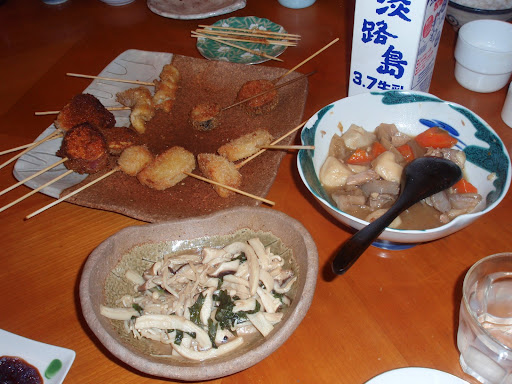
And because there already were many requests: Here's "my" family

Sunday:
Here I was once again hiking with David from Ireland, in the ridge of the Kobe-region, this time to Peak Maya. We were a little bit disappointed however when we got up pretty fast, which then again isn't astonishing considering the ca. 701 meters, whereupon the view over the region was again amazing. On the descend we left the hiking track and waded trough the woods and a dried up river bed. This was fun, exhausting, for David also a little dangerous, since he isn't really used to mountains and rocks and it was a compensation for the boring ascend. All in all we were en route for only 7 hours this time (net hiking time: 6).
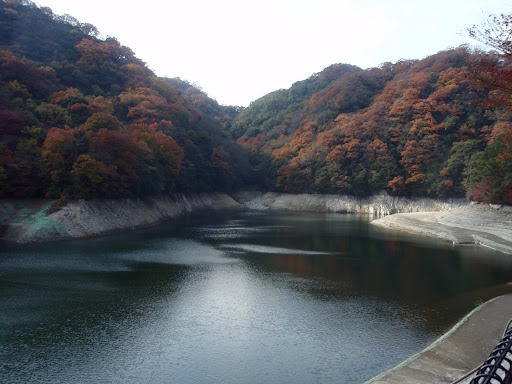
To round off the weekend in the weekend I went to eat Yakiniku (literal: roasted/grilled meat) with the Briton Simon too. For this you get the food (80% meat therefor) served raw and flavoured, which then you grill by yourself via an in the table board embedded grill. Exceedingly tasty and not even that expensive in the right restaurants.
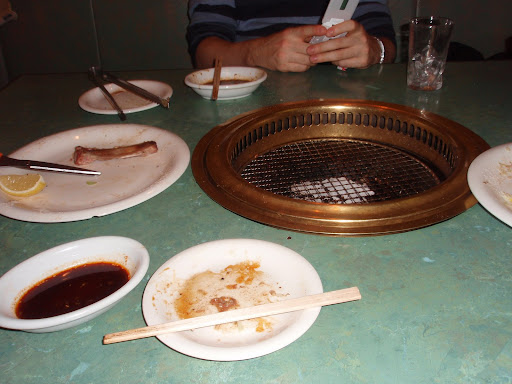
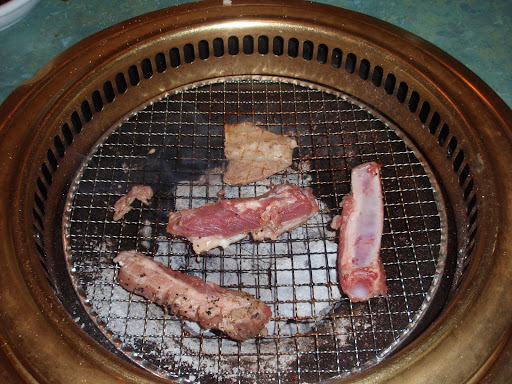
Interesting (and funny) facts/opinions about Japan:
Known very much, and appreciated especially by foreigners, are so called Hyaku-en (100 yen) shops in Japan. For, as the name suggests, the price of most wares is only at 100 yen (ca. 64 cent). More expensive products are tagged specially. The main part of the product line-up is composed by daily housewares and commodities, whereas the quality, opposed to the suggestion by the low price quite satisfying is. Since those objects are ideal, if you are only staying a couple of months or a year in Japan, I said especially with foreigners, who don't need top-quality, durable for many years. However, many Japanese too puchasee stuff there themselves, and as such not only those who are on a budget on necessity, because it is nothing laughable socially in shopping at a Hyaku-en shop. Not like it was at home in earlier times, when people, who to Hofer for shopping were smiled upon. The again, Hofer too has advanced itself concerning the quality of its products. Larger shops house also foods and middle-sized equipment with their assortment, thus my tip: Should one stay in Japan for only a short time and despite that have a need for housewares, those shops offer nearly always the best price-performance ratio.
This time too a relative short entry, for there didn't happen much new.
Friday:
A group of people was in the evening at Osaka to celebrate the birthday of the female Swede from our student's home. We stayed the whole night at a club, where a couple arguably exaggerated celebrating (expecially the male Swede and our in-house Bulgarian).
However, the most eye-catchers were the girls. I have never seen so many girls, who looked the like, excuse the expression, "cheap whores", but seriously, those you see at home mostly on the edge of the footpath (sidewalk), personelly can't stand something like that at all.
Should anyone still believe that all japanese girls are dressed reserved and "chaste", he should visit such a club because those are only there for picking up guys. One of the lads who were with us left the club with "one of those". Concerning myself I tried to rather stay away. And before anyone now comes up with "Are you nuts? Letting go of a sure thing?" or something similar, I just say: If someone likes things like this, please, be my guest, but please don't come running crying, when you caught anything, and if it only be a swinging blow of one of 'em 2 metre blacks (there were several at the club) who has he sights on the same one.
Didi must be sooo proud
Saturday:
A ususal day filled woth learning and spiced up by preparing a group presentation for Tuesday, which, by the way, went well. Even though one of my japanese partners can speak very little English and I had therefore present his part too.
Afterwards I was once again invited at my hostfamily's from the summer to dinner, which was (as always) excellent. After that I showed them a few pictures from Neusiedl, the concert band and the Uhudler-cellar-district festival (ad Bernie: You were captured really well, but they were most amused about Dominik's "sleeping at the table).
And because there already were many requests: Here's "my" family
Sunday:
Here I was once again hiking with David from Ireland, in the ridge of the Kobe-region, this time to Peak Maya. We were a little bit disappointed however when we got up pretty fast, which then again isn't astonishing considering the ca. 701 meters, whereupon the view over the region was again amazing. On the descend we left the hiking track and waded trough the woods and a dried up river bed. This was fun, exhausting, for David also a little dangerous, since he isn't really used to mountains and rocks and it was a compensation for the boring ascend. All in all we were en route for only 7 hours this time (net hiking time: 6).
To round off the weekend in the weekend I went to eat Yakiniku (literal: roasted/grilled meat) with the Briton Simon too. For this you get the food (80% meat therefor) served raw and flavoured, which then you grill by yourself via an in the table board embedded grill. Exceedingly tasty and not even that expensive in the right restaurants.
Interesting (and funny) facts/opinions about Japan:
Known very much, and appreciated especially by foreigners, are so called Hyaku-en (100 yen) shops in Japan. For, as the name suggests, the price of most wares is only at 100 yen (ca. 64 cent). More expensive products are tagged specially. The main part of the product line-up is composed by daily housewares and commodities, whereas the quality, opposed to the suggestion by the low price quite satisfying is. Since those objects are ideal, if you are only staying a couple of months or a year in Japan, I said especially with foreigners, who don't need top-quality, durable for many years. However, many Japanese too puchasee stuff there themselves, and as such not only those who are on a budget on necessity, because it is nothing laughable socially in shopping at a Hyaku-en shop. Not like it was at home in earlier times, when people, who to Hofer for shopping were smiled upon. The again, Hofer too has advanced itself concerning the quality of its products. Larger shops house also foods and middle-sized equipment with their assortment, thus my tip: Should one stay in Japan for only a short time and despite that have a need for housewares, those shops offer nearly always the best price-performance ratio.
Thursday 1 July 2010
Momiji on Labour Day
Original Posting Date: Wednesday November 28th 2007
Today it will be a rather short entry because I'll let the pictures speak for it and I refer to my picture album respectively.
(My apologies to those, who own a slower internet-connection and therefore have problems with looking at photos).
So:
Last friday was "Labour Day" in Japan and as it conforms to worldwide tradition, no one is working on such a day (then again, this is Japan meaning Convenience-stores are still open 24 hours).
Anyway some people and I decided to join the hundreds and thousands of Japanese and go view Momiji. That's how in Japan the discolour of the foliage, the time of it respectively is called and the viewing of the same (cf. Cherry blossom viewing in spring).
Actually it's rather late for it, Momiji normally happens in late autumn (traditionelly in Japan autumn is considered to be from 8.8. to 11.6.) but like some Japanese told me it gets later from year to year and especially this year, because it was an exceptionally hot year altogether (that's climate change for Japan).
At any rate we decided to go to Kyoto to the eastern Kyomizu-temple (I've already visited it in summer maybe some day I finish my report about that), und before that, to kill some time in Kyoto.
First the Maruyama-park, then another temple, and finally in the later afternoon in direction to our target destination. The main route to the temple is a small road (reminds on old times with shops on the left and right and only for pedestrians), which was hopelessly cramped. Though in the end it was more than worth it. The blaze of colour was partially overwhelming. That's why I am quiet now, and let only the pictures speak (whereupon the first is still from the park and the second one was taken in the other temple).
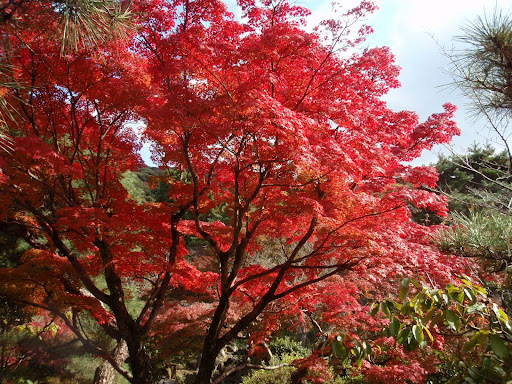
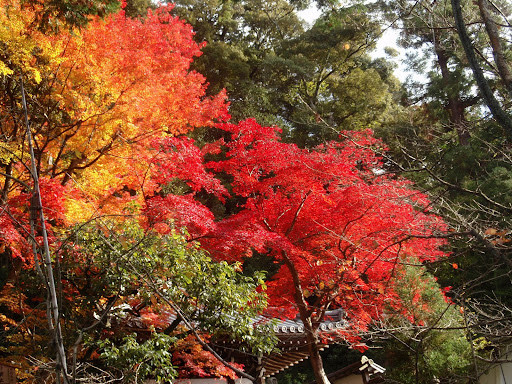
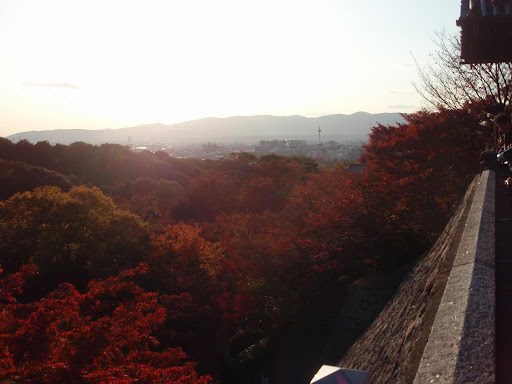
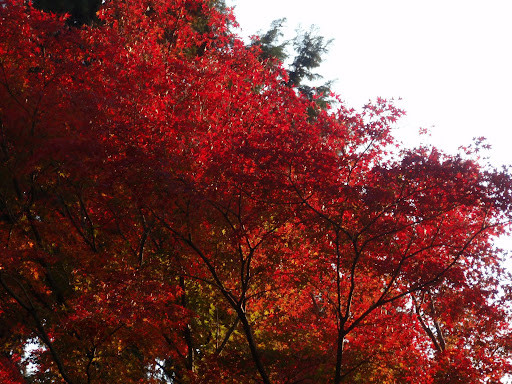
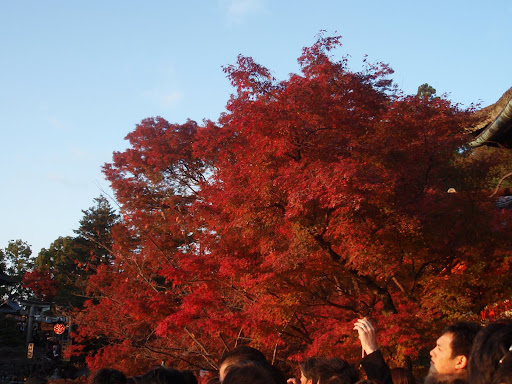
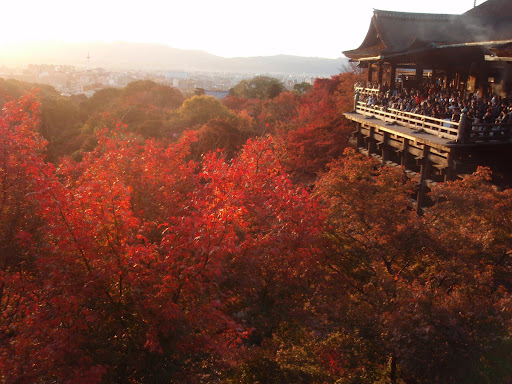
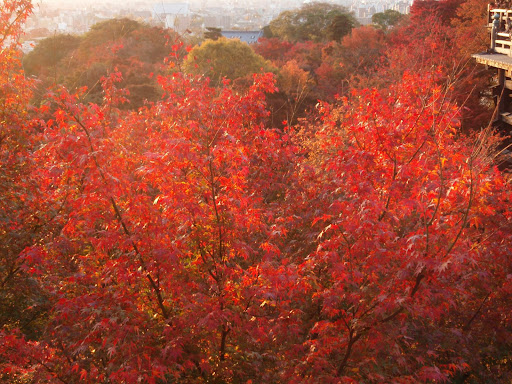
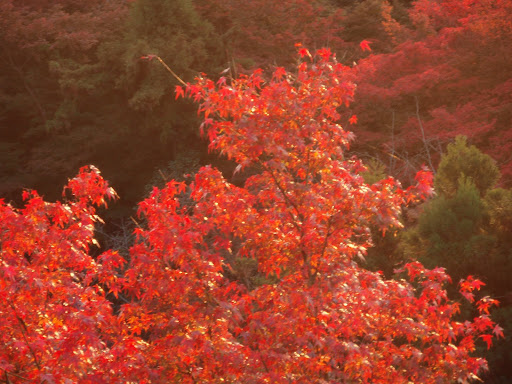
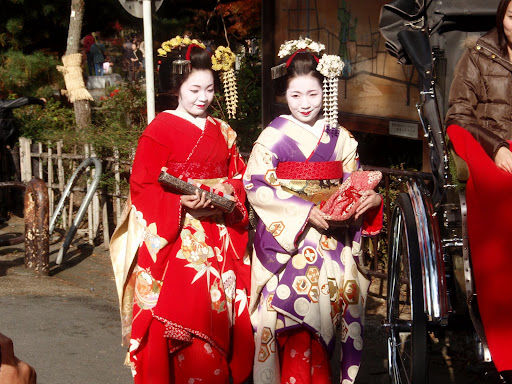
In the webalbum (link on the right), are the remaining photos under "Japan: Landschaften 2" to be admired, there are well around one hundred from that day.
Also in the evening lots of Geishas were roaming the streets (Kyoto is the cradle of Geisha-culture), whereupon I sadly only 3 photos have of it. Anecdote in passing: On the way home two Geishas asked me if couldn't take a picture of them with their camera (not the ones in the photo). At any rate, she adressed me very hesitantly by an "Excuse me", but when I answered "Yes, go on?" in Japanese, you could, despite the make-up, see her becoming all smiles, along the lines of: "That one can understand me, English is not necessary!"
It takes so little, to make Japanese girls happy ...
Interesting (and funny) facts/opinions about Japan:
In Japan promotion for pubs and the like is often still carried out by puffers on the street. First and foremost they are used for promoting Karaoke-bars and eateries (which are here more or less substituting for our inns). It is really interesting to yet see this kind of advertisement, for at home it virtually has been completely replaced by the handing out (sometimes quite aggressively) of flyers.
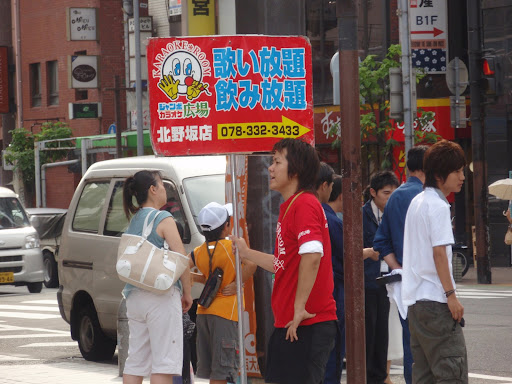
And here the perfect in-between snack: Chewy octopus
(as some people constantly want to see pictures of things to eat)
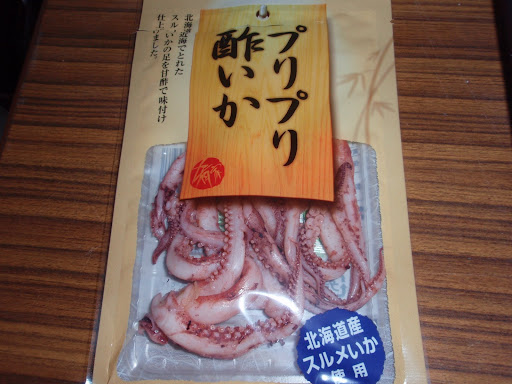
In conclusion a Japanese with a Styrian-style hat (didn't get the chance to ask where he got it from)
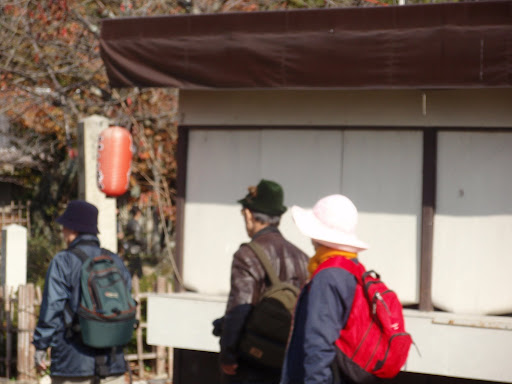
Today it will be a rather short entry because I'll let the pictures speak for it and I refer to my picture album respectively.
(My apologies to those, who own a slower internet-connection and therefore have problems with looking at photos).
So:
Last friday was "Labour Day" in Japan and as it conforms to worldwide tradition, no one is working on such a day (then again, this is Japan meaning Convenience-stores are still open 24 hours).
Anyway some people and I decided to join the hundreds and thousands of Japanese and go view Momiji. That's how in Japan the discolour of the foliage, the time of it respectively is called and the viewing of the same (cf. Cherry blossom viewing in spring).
Actually it's rather late for it, Momiji normally happens in late autumn (traditionelly in Japan autumn is considered to be from 8.8. to 11.6.) but like some Japanese told me it gets later from year to year and especially this year, because it was an exceptionally hot year altogether (that's climate change for Japan).
At any rate we decided to go to Kyoto to the eastern Kyomizu-temple (I've already visited it in summer maybe some day I finish my report about that), und before that, to kill some time in Kyoto.
First the Maruyama-park, then another temple, and finally in the later afternoon in direction to our target destination. The main route to the temple is a small road (reminds on old times with shops on the left and right and only for pedestrians), which was hopelessly cramped. Though in the end it was more than worth it. The blaze of colour was partially overwhelming. That's why I am quiet now, and let only the pictures speak (whereupon the first is still from the park and the second one was taken in the other temple).
In the webalbum (link on the right), are the remaining photos under "Japan: Landschaften 2" to be admired, there are well around one hundred from that day.
Also in the evening lots of Geishas were roaming the streets (Kyoto is the cradle of Geisha-culture), whereupon I sadly only 3 photos have of it. Anecdote in passing: On the way home two Geishas asked me if couldn't take a picture of them with their camera (not the ones in the photo). At any rate, she adressed me very hesitantly by an "Excuse me", but when I answered "Yes, go on?" in Japanese, you could, despite the make-up, see her becoming all smiles, along the lines of: "That one can understand me, English is not necessary!"
It takes so little, to make Japanese girls happy ...
Interesting (and funny) facts/opinions about Japan:
In Japan promotion for pubs and the like is often still carried out by puffers on the street. First and foremost they are used for promoting Karaoke-bars and eateries (which are here more or less substituting for our inns). It is really interesting to yet see this kind of advertisement, for at home it virtually has been completely replaced by the handing out (sometimes quite aggressively) of flyers.
And here the perfect in-between snack: Chewy octopus
(as some people constantly want to see pictures of things to eat)
In conclusion a Japanese with a Styrian-style hat (didn't get the chance to ask where he got it from)
Friday 5 March 2010
Funny and Exhausting
Original Posting Date: Wednesday November 21st 2007
A week ago I was not only at the Game Convention in Osaka but also on Saturday at the University festival. Something like this is always a big thing in Japan.
It lasts 2 days (Saturday and Sunday) and is for the most part organised by the students and student clubs themselves respectively, for this reason starting from Friday noon before all courses are cancelled.
The festivity itself elapses as follows:
On each day from 9 o'clock a.m. to 5 o'clock p.m. countless stands are open on the main campus (as mentioned, operated by students) which offer all sorts of good stuff for eating and drinking, or different games (i.e. archery). It's a huge commotion (I was surprised myself about the scale) Of course it's another opportunity to let go of the bonds of uniformity, to dress crazy and act accordingly.

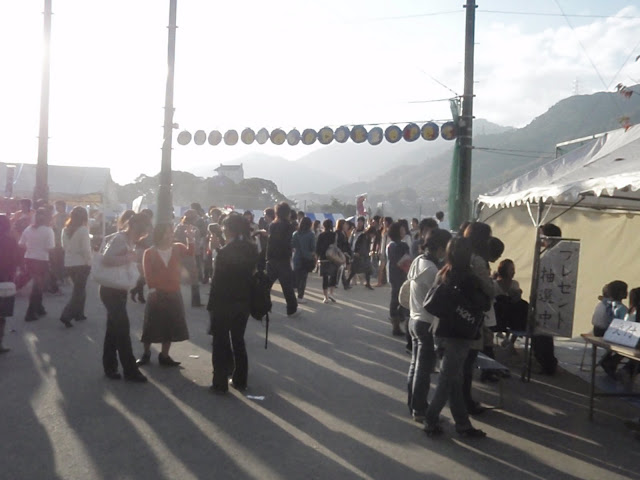
These are guys:
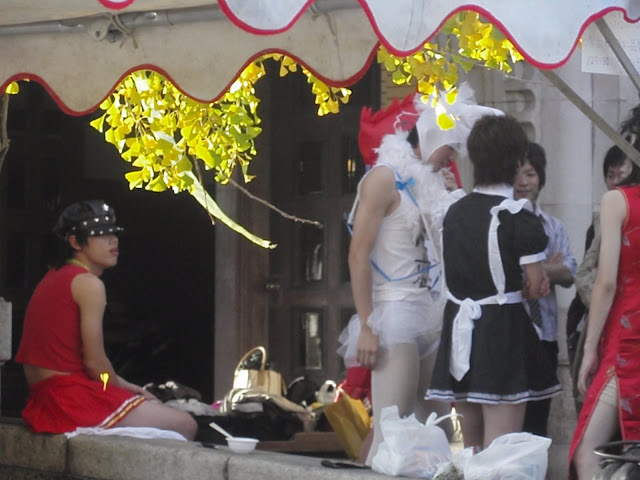
In addition bands play at different locations and lots of small shows are on on several stages. At 5 o'clock the stands close and on the main stage a good show is featured for 1-2 hours (here's an example):
Please note that no music or instruments were employed but both groups only used their voices.
After that the main part is finished, but one still has the chance to watch mini shows at other faculties or to go one of the bars established on campus (Legal drinking age in Japan: 20 years, and it's strictly checked at the university). The alcohol itself is partly good partly hooch and it's not mixed very strong respectively (but at 60 Euro-Cent for a Whisky-Coke or a Wodka-Lemon it's NO matter at all).
Since most students are working, the major part of the visitors is comprised of non-students (or non-university member), which is a good public relations work for the university.
Personally I think it's a great pity that we don't have something like this. Although on the other hand you probably could hardly enthuse our students to work voluntarily and without gratification for a University-festive (at least not the number of students you need). Students in Graz may interject that there is the Usi festival. But let's be frank: You cannot truly compare that great festival here with that stupidious Binching-event at home!
Last weekend:
A friend (David from Ireland) and I decided to finally hike up to the highest elevation of the Rokko-ridge, which we realised on Sunday. In short: It was gorgeous ...
The highest peak (Rokko itself) of the ridge is in fact only 931m high, but since the ascent is relatively shallow, it's a rather long way from the station (ca. 4-5 hours). Since we unfortunately started out very late (David overslept) and it was already after 15:00 o'clock when we reached the top (Sunset: 16:35 o'clock), we couldn't take a hiking road down, but trekked westward on the road along the "peaks", until, through a twisting road, we arrived at the train station. Altogether we nearly marched 9 hours continously! (a little exaggeratedly for the first time)
Specified procedure of the whole thing: At 10:30 o'clock move-out to the train station, 6 stops, and at 11:00 o'clock beginning of the ascent. At around 4 on the top, afterwards westward, at 20:00 o'clock at the train station of the University, then the (now only 3) stops back, and at 21:00 o'clock we were finally at home. All in all it was probably between 40-50km (I don't know exactly because of the heavy twisting road we took the last 2 hours)
It was really exhausting but way worth it.
If time permits I'm gonna frequently hike up the (smaller) mountains, and Fuji-san (wrongly called Fujijama at home) is also still expecting me.
This time more pictures than usually

A king wonders about his realm ...

Mmm, dinner!

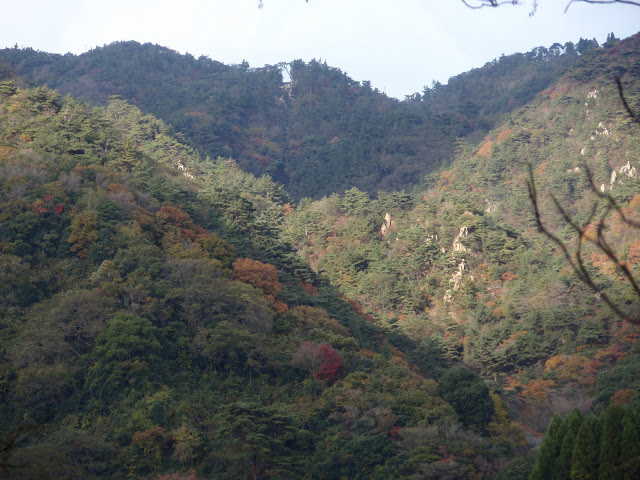


Finally at the peak

Onwards to the west

More pictures and videos are, as always, in the album
Interesting (and funny) facts/opinions about Japan:
By now, everyone should know that the Japanese hold sports (physical training) and community in high regard, nonetheless the manifestations sometimes can scare a little bit.
When, for example, the school girls run by the student's home on the footpath, one sometimes asks himself if that are school girls training there or the local military unit. Not only do they oftentimes run nicely in groups (even in formation), no, like in the military the first in the group cries out a sort of warcry or sings something, which they others repeat in chorus.
Unfortunately for the time being there's not picture of video available but should I get hold on one I will put it on the blog.
On the topic of continuity: In the future there will be a new entry every Wednesday, with occasional extra issues on weekends.
A week ago I was not only at the Game Convention in Osaka but also on Saturday at the University festival. Something like this is always a big thing in Japan.
It lasts 2 days (Saturday and Sunday) and is for the most part organised by the students and student clubs themselves respectively, for this reason starting from Friday noon before all courses are cancelled.
The festivity itself elapses as follows:
On each day from 9 o'clock a.m. to 5 o'clock p.m. countless stands are open on the main campus (as mentioned, operated by students) which offer all sorts of good stuff for eating and drinking, or different games (i.e. archery). It's a huge commotion (I was surprised myself about the scale) Of course it's another opportunity to let go of the bonds of uniformity, to dress crazy and act accordingly.
These are guys:
In addition bands play at different locations and lots of small shows are on on several stages. At 5 o'clock the stands close and on the main stage a good show is featured for 1-2 hours (here's an example):
Please note that no music or instruments were employed but both groups only used their voices.
After that the main part is finished, but one still has the chance to watch mini shows at other faculties or to go one of the bars established on campus (Legal drinking age in Japan: 20 years, and it's strictly checked at the university). The alcohol itself is partly good partly hooch and it's not mixed very strong respectively (but at 60 Euro-Cent for a Whisky-Coke or a Wodka-Lemon it's NO matter at all).
Since most students are working, the major part of the visitors is comprised of non-students (or non-university member), which is a good public relations work for the university.
Personally I think it's a great pity that we don't have something like this. Although on the other hand you probably could hardly enthuse our students to work voluntarily and without gratification for a University-festive (at least not the number of students you need). Students in Graz may interject that there is the Usi festival. But let's be frank: You cannot truly compare that great festival here with that stupidious Binching-event at home!
Last weekend:
A friend (David from Ireland) and I decided to finally hike up to the highest elevation of the Rokko-ridge, which we realised on Sunday. In short: It was gorgeous ...
The highest peak (Rokko itself) of the ridge is in fact only 931m high, but since the ascent is relatively shallow, it's a rather long way from the station (ca. 4-5 hours). Since we unfortunately started out very late (David overslept) and it was already after 15:00 o'clock when we reached the top (Sunset: 16:35 o'clock), we couldn't take a hiking road down, but trekked westward on the road along the "peaks", until, through a twisting road, we arrived at the train station. Altogether we nearly marched 9 hours continously! (a little exaggeratedly for the first time)
Specified procedure of the whole thing: At 10:30 o'clock move-out to the train station, 6 stops, and at 11:00 o'clock beginning of the ascent. At around 4 on the top, afterwards westward, at 20:00 o'clock at the train station of the University, then the (now only 3) stops back, and at 21:00 o'clock we were finally at home. All in all it was probably between 40-50km (I don't know exactly because of the heavy twisting road we took the last 2 hours)
It was really exhausting but way worth it.
If time permits I'm gonna frequently hike up the (smaller) mountains, and Fuji-san (wrongly called Fujijama at home) is also still expecting me.
This time more pictures than usually
A king wonders about his realm ...
Mmm, dinner!
Finally at the peak
Onwards to the west
More pictures and videos are, as always, in the album
Interesting (and funny) facts/opinions about Japan:
By now, everyone should know that the Japanese hold sports (physical training) and community in high regard, nonetheless the manifestations sometimes can scare a little bit.
When, for example, the school girls run by the student's home on the footpath, one sometimes asks himself if that are school girls training there or the local military unit. Not only do they oftentimes run nicely in groups (even in formation), no, like in the military the first in the group cries out a sort of warcry or sings something, which they others repeat in chorus.
Unfortunately for the time being there's not picture of video available but should I get hold on one I will put it on the blog.
On the topic of continuity: In the future there will be a new entry every Wednesday, with occasional extra issues on weekends.
Tuesday 9 February 2010
Osaka Game Festa
Original Posting Date: Wednesday November 14th 2007
(edit: Yes, I know it's more than 1 1/2 years since my last entry on both blogs, I try to redeem for that in the future)
This entry is virtually only interesting for Gamer, the rest of you is excused.
Not that I want to prevent you from reading, but it may bore the others or the rather won't have any idea about what's going on respectively.
The Non-gamers may directly go to the Facts column or have a look at the Cosplay pictures (people who dress up as Anime- or Game-characters) before that.
So:
On sunday I was with some other people at the Osaka Game Festa, a gaming convention. It is by far not as big as the Tokyo Game Show (TGS), the old E3 or PAX but nonetheless it was great and we had tons of fun. Unfortunately there are only a few photos, we were too considered with gaming.



A small selection of the featured games:
Guitar Hero III:
I have never played the other installments but despite the simple concept it's insane fun fiddling with the guitar.
WII Fit:
New gear for the WII, a platform to stand on and play utilising your feet and body motions. Skiing and skijumping was simply ingenious using it. They stay true to their concept of a family console, since naturally there's also software for work out and body stretching, the WII saves you aerobic-training.
Mario & Sonic Olympic Games (even allowed to use the official Logo of Beijing 2008): Ingenious idea: All the well-known and loved characters of Sega (Sonic, Tails, Robotnik and company) and Nintendo (Mario, Luigi, Bowser et al.) compete in olympic disciplines, from 100m Run beyond Long Jump to Hammer Throwing. Playing that one with friends is almost more fun than WII Sports.
And of course PS3 and Disgaea 3:
It looked alike its predecessing parts (graphical etc.) with likewise elements but as we all know concerning Disgaea it never was about the grahpics or an exceptionally epic story, it's just like always but that's exactly what makes it good. And the main character Mao also packs quite a punch.

Oooohh, Prinny, Prinny, PrinnyPrinnyPrinnyPrinny, Dood, Prinny, Dood, Dood, KABOOM

As at every Gaming-convention (edit: digital or not): Cosplayer
(Although there are lots more people taking part in it in the US than Japan)
VIVI!
and Eiko
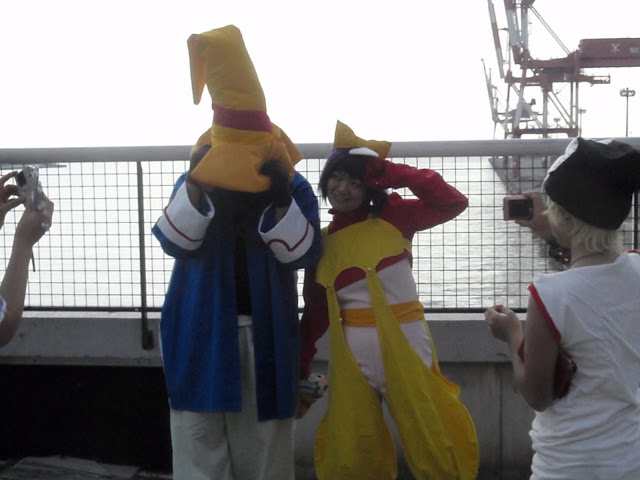
Card Captor Sakura (but how!)
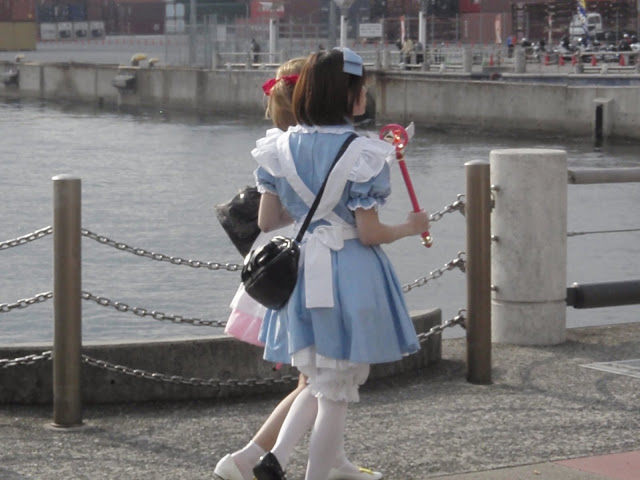
Spidey also paid us a visit
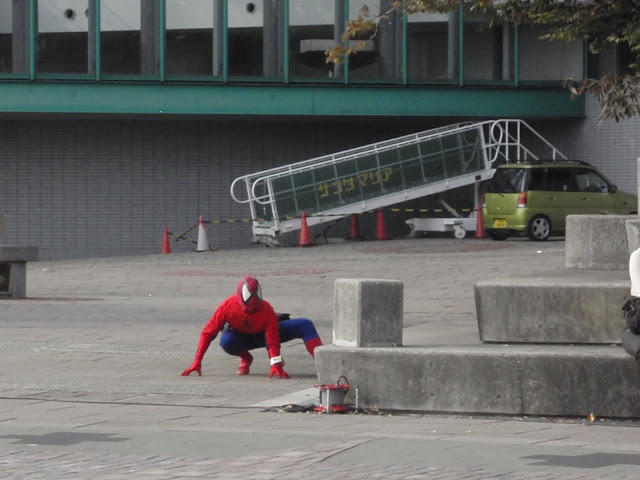

I have no idea what that was (anyone does?), but it was funny how it drove through
the area, (especially the children were thrilled)
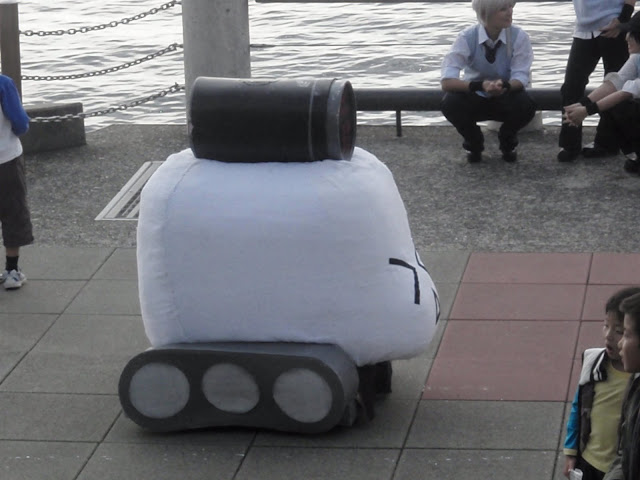

The gang of Kingdon Hearts II was also there, but sadly I don't have a nice photo.
And of course: FINAL FANTASY VII: Advent Children
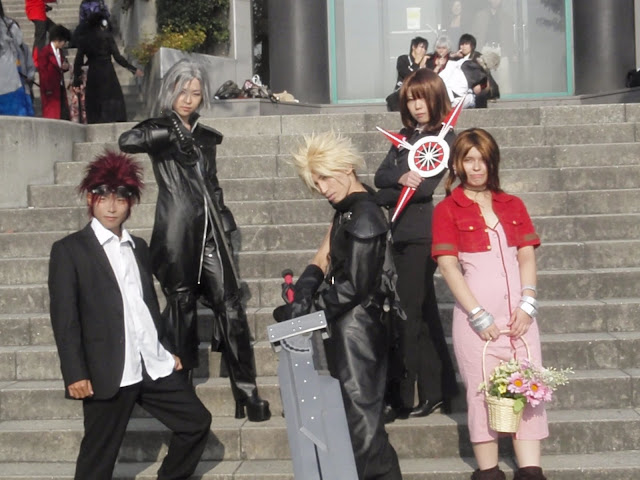
One of the girls (from Seattle), who were with us is also into Cosplay, but she left her Yuffie-costume at home, well, bad luck.
More pictures will be on my album under "Verschiedenes" (edit: miscellaneous)
Should anyone be able to name all the characters on the pictures and send me an E-Mail with the answers to manuel.leitgeb"AT"gmail.com I will bring him a reward with me from Japan (I won't give away what that'll be).
Interesting (and funny) facts/opinions about Japan:
Since the Japanese never invented buttons or zippers, they always have used bands, for example for clothing, which has led over time to rather complicated lace fastenings (anyone who has ever taken a closer look at traditional clothing knows that). The same applied to packaging, which also (actually more often) was being handled by complex folding of the outer material (fabric, cloth or paper). The point I want to make is, that this tradition can still be seen in even the simpliest packagings. The wrapping of purchasings is an important activity even if the product itself is already wrapped up. For instance: When you buy a large electric device, it is already completely in its package and ready to go but nonetheless it is taken by the sales-person, two plastics-straps are winded around it by a machine and a small plastic handle is being attached to it for the purpose of an easier transport. If you are buying something at the super-market, or wherever (meaning smaller stuff), you ALWAYS are automatically treated to a plastic bag and if there aren't already other people waiting, you get your purchase bagged in by the clerk.
(edit: I know that's nothing new for people from the US etc. having baggers and such, but in Austria this is unheard of).
The other side can be seen at getting presents: If those are wrapped up in giftpaper it won't simply be "shredded", like at home, but rather carefully removed to convey the appreciation for the present. Although most of the time presents aren't unwrapped immediately but put to the side for the time being. On the one hand it is because at birthdays etc. where you get several presents in succession you can't take the appropriate time for unwrapping, on the other hand you avoid neither the Giver nor the Receiver losing their faces, should the gift not be well received.
And to conclude: I have found the perfect in-between snack:
Smoked Squid-slices
(Okay, perfect would have been octopus, but squid is great too)

(edit: Yes, I know it's more than 1 1/2 years since my last entry on both blogs, I try to redeem for that in the future)
This entry is virtually only interesting for Gamer, the rest of you is excused.
Not that I want to prevent you from reading, but it may bore the others or the rather won't have any idea about what's going on respectively.
The Non-gamers may directly go to the Facts column or have a look at the Cosplay pictures (people who dress up as Anime- or Game-characters) before that.
So:
On sunday I was with some other people at the Osaka Game Festa, a gaming convention. It is by far not as big as the Tokyo Game Show (TGS), the old E3 or PAX but nonetheless it was great and we had tons of fun. Unfortunately there are only a few photos, we were too considered with gaming.
A small selection of the featured games:
Guitar Hero III:
I have never played the other installments but despite the simple concept it's insane fun fiddling with the guitar.
WII Fit:
New gear for the WII, a platform to stand on and play utilising your feet and body motions. Skiing and skijumping was simply ingenious using it. They stay true to their concept of a family console, since naturally there's also software for work out and body stretching, the WII saves you aerobic-training.
Mario & Sonic Olympic Games (even allowed to use the official Logo of Beijing 2008): Ingenious idea: All the well-known and loved characters of Sega (Sonic, Tails, Robotnik and company) and Nintendo (Mario, Luigi, Bowser et al.) compete in olympic disciplines, from 100m Run beyond Long Jump to Hammer Throwing. Playing that one with friends is almost more fun than WII Sports.
And of course PS3 and Disgaea 3:
It looked alike its predecessing parts (graphical etc.) with likewise elements but as we all know concerning Disgaea it never was about the grahpics or an exceptionally epic story, it's just like always but that's exactly what makes it good. And the main character Mao also packs quite a punch.
Oooohh, Prinny, Prinny, PrinnyPrinnyPrinnyPrinny, Dood, Prinny, Dood, Dood, KABOOM
As at every Gaming-convention (edit: digital or not): Cosplayer
(Although there are lots more people taking part in it in the US than Japan)
VIVI!
and Eiko
Card Captor Sakura (but how!)
Spidey also paid us a visit
I have no idea what that was (anyone does?), but it was funny how it drove through
the area, (especially the children were thrilled)
The gang of Kingdon Hearts II was also there, but sadly I don't have a nice photo.
And of course: FINAL FANTASY VII: Advent Children
One of the girls (from Seattle), who were with us is also into Cosplay, but she left her Yuffie-costume at home, well, bad luck.
More pictures will be on my album under "Verschiedenes" (edit: miscellaneous)
Should anyone be able to name all the characters on the pictures and send me an E-Mail with the answers to manuel.leitgeb"AT"gmail.com I will bring him a reward with me from Japan (I won't give away what that'll be).
Interesting (and funny) facts/opinions about Japan:
Since the Japanese never invented buttons or zippers, they always have used bands, for example for clothing, which has led over time to rather complicated lace fastenings (anyone who has ever taken a closer look at traditional clothing knows that). The same applied to packaging, which also (actually more often) was being handled by complex folding of the outer material (fabric, cloth or paper). The point I want to make is, that this tradition can still be seen in even the simpliest packagings. The wrapping of purchasings is an important activity even if the product itself is already wrapped up. For instance: When you buy a large electric device, it is already completely in its package and ready to go but nonetheless it is taken by the sales-person, two plastics-straps are winded around it by a machine and a small plastic handle is being attached to it for the purpose of an easier transport. If you are buying something at the super-market, or wherever (meaning smaller stuff), you ALWAYS are automatically treated to a plastic bag and if there aren't already other people waiting, you get your purchase bagged in by the clerk.
(edit: I know that's nothing new for people from the US etc. having baggers and such, but in Austria this is unheard of).
The other side can be seen at getting presents: If those are wrapped up in giftpaper it won't simply be "shredded", like at home, but rather carefully removed to convey the appreciation for the present. Although most of the time presents aren't unwrapped immediately but put to the side for the time being. On the one hand it is because at birthdays etc. where you get several presents in succession you can't take the appropriate time for unwrapping, on the other hand you avoid neither the Giver nor the Receiver losing their faces, should the gift not be well received.
And to conclude: I have found the perfect in-between snack:
Smoked Squid-slices
(Okay, perfect would have been octopus, but squid is great too)
Subscribe to:
Posts (Atom)